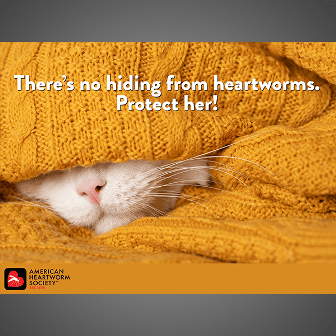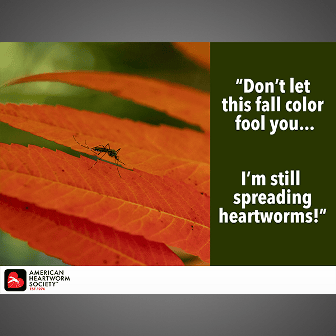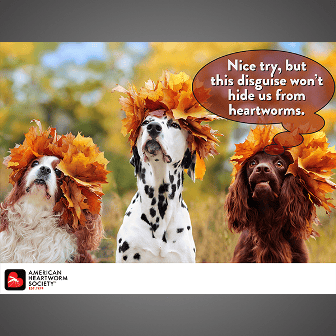One little bite. That teensy, annoying mosquito sting is all it takes to infect your pet with devastating heartworm disease. But the good news is that the American Heartworm Society (AHS) has updated guidelines so veterinarians can readily educate pet owners about this potentially fatal illness. The new 2005 guidelines recommend annual testing, testing in between prevention product changes, and year-round prevention in order to manage heartworm disease.
During the American College of Veterinary Internal Medicine Forum in Baltimore on June 1, the AHS announced the "2005 Guidelines for the Diagnosis, Prevention and Management of Heartworm Infection in Dogs," and the "2005 Guidelines for the Diagnosis, Prevention and Management of Heartworm Infection in Cats." Heartworms are parasitic worms living in the arteries of the lungs and in the right side of the heart, causing a variety of health problems, possibly leading to death. Mosquitoes help spread the disease in a vicious cycle to and from pets.
"Each year, dogs and cats die needlessly from complications to this very preventable disease," says Charles Thomas Nelson, DVM and President of the American Heartworm Society. "These new guidelines are based upon the latest, ongoing research conducted around the world," he adds. The research is done by several sources, and the AHS compiles it to create the guidelines. These sources include pharmaceutical companies, private laboratories and veterinarians and parasitologists at several universities.
The American Heartworm Society wants veterinarians and pet owners to know the following:
Annual Testing is Necessary
In the past, if a dog had been on preventive methods routinely, it was not necessary to test every year, perhaps only every two to three years. But because of some concerns with breaks regarding animals on preventives that still contracted heartworms, the AHS recommends a more conservative testing routine. It may be too difficult to document when an animal hasn't been checked in three years, and therefore, annual testing will ensure that an infection is caught in plenty of time to effectively manage it.
Switching Prevention Methods Requires Additional Testing
Pet owners sometimes switch between prevention medications, for any number of reasons. In these instances, there are specific time periods to retest in order to ensure the pet is protected. When switching from one product to another, it is necessary to test more often.
Year-Round Prevention is Supported
Most veterinarians recommend year-round heartworm prevention, even in seasonal areas. One reason for this is compliance - making sure the medicine has been given properly by the pet owner. Surveys show that probably only 75 percent of the prescribed doses are given. But, even if doses are accidentally skipped, the drug is still beneficial to the pet. If given consistently over a 12-month period, it's possible to actually stop worms from developing into adults. Also, monthly heartworm preventives have activity against intestinal parasites, which inadvertently infect three to six million people every year. These preventives protect pets and people.
Education is Key
Getting the word out to the entire veterinary profession and to the general public on a more frequent basis is a goal of the American Heartworm Society. Therefore, you can find the guidelines posted on the Society's web site at www.heartwormsociety.org.
"We wanted to make these guidelines available to everyone, so that the entire veterinary profession and the pet-owning public will have access to information based on research on the ways to diagnose, prevent and manage this disease," concludes Nelson.
Mosquitoes may keep biting, but the American Heartworm Society guidelines can help take some of the sting out of heartworm disease.
Founded during the Heartworm Symposium of 1974, the American Heartworm Society was formed to facilitate and encourage the generation and dissemination of information about heartworm disease and encourages adoption of standardized procedures for its diagnosis, treatment and prevention. The American Heartworm Society stimulates and financially supports research, which furthers knowledge and understanding of the disease. Its headquarters are located in Batavia, Ill.








